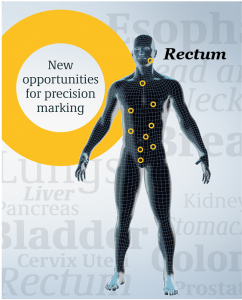Rectal cancer
Radiation therapy plays an important role in the treatment of rectal cancer.
The use of BioXmark® may allow for significantly increased dose escalation to target volumes and reduced dose to healthy tissue in connection with radiation therapy for rectal cancer.

BioXmark® for high-precision radiation therapy of rectal cancer
– White paper
Discover BioXmark® advantages and clinical evidence for rectal cancer radiation therapy:
Click to download the white paper
BioXmark® facilitates precision radiation therapy for rectal cancer
In a clinical study publication, Willems et al. conclude that the use of BioXmark®
“may allow for significantly increased dose escalation to target volumes and reduced dose to normal tissue compared to CBCT based boosting without fiducial implantation..”(1).
Click to read the study publication
Facts about rectal cancer
In North America and Europe, rectal cancer is the 7th most cost common cancer with approximately 236,000 new cases and ranks 8th based on mortality with approximately 100,000 deaths in 2020(2).
Rectal cancer is often grouped epidemiologically with colon cancer, termed colorectal cancer,, which ranks as the 4th most common cancer and 2nd based on mortality (in North America and Europe).
The majority of rectal cancers are adenocarcinomas(3).
Clinical presentation and diagnosis
Symptoms of rectal cancer include rectal bleeding, change in bowel habits, abdominal pain, intestinal obstruction, change in appetite, weight loss and weakness.
Age is, like for most other cancers, the most important risk factor for developing rectal cancer. Other risk factors include family history, excessive alcohol use, cigarette smoking and obesity(3).
Several countries have implemented rectal cancer screening programs for adults over a certain age, typically 50 years(4).
Treatment
The treatment plan for rectal cancer depends on several factors, including the stage and the patient’s general health. Treatment options include surgery, radiation therapy, chemotherapy, immunotherapy or a combination of therapies. Surgery alone as well as surgery combined with preoperative or postoperative chemoradiation therapy is used(3).
Radiation therapy for rectal cancer
The primary treatment for rectal cancer patients is surgical resection of the primary tumor(3). Radiation therapy also plays an important role in the treatment of rectal cancer and approximately 60% percent of rectal cancer patients have an evidence-based indication for radiation therapy(5).
For rectal cancer stage I patients, where the tumor only extends into the submucosa (T1) or into the bowel muscular layer (T2), surgery with or without chemoradiation therapy is the standard treatment option.
For rectal cancer stages II and III patients (T3-T4 or node-positive disease stages), preoperative chemoradiation therapy has become the standard of care. Clinical evidence suggests that for patients with a complete clinical response to the chemoradiation it is reasonable to consider this treatment curative and follow these patients by active surveillance (watch and wait approach). Radiation therapy also plays a role together with surgery in the treatment of stage IV patients and may be used also as palliative treatment(3).
Radiation dose escalation is expected to result in an increased clinical complete response rate in rectal cancer patients. Dose escalation may enable more patients to qualify for an organ sparing approach by omission of surgery(1).
How can BioXmark® add value in the treatment of patients with rectal cancer?
Use of BioXmark® may allow for significantly increased dose escalation to target volumes and reduced dose to normal tissue in connection with radiation therapy of rectal cancer.
In a trial performed at MAASTRO Clinic Maastricht, NL, four BioXmark® markers were injected into the rectal wall of each patient, two markers above and two markers below the tumour. The preliminary conclusions of the study have been presented in a master thesis with a publication to follow(6). The results showed that BioXmark® did not migrate, based on no migration seen for 95.8% out of 72 analysed markers, and that BioXmark® markers were clearly visible on planning CT scan and day-to-day cone beam CT. The thesis concludes that “BioXmark® showed to be feasible to act as a tumor location surrogate on daily cone beam CT for image guided radiotherapy. BioXmark® may provide us a tool to follow day-to-day tumor location and may thereby enable dose escalation in rectal cancer patients”.
In another publication from the same institution, Willems et al. aimed to determine the required PTV margins for external beam radiotherapy (EBRT) boosting in rectal cancer patients when using BioXmark® fiducials(1). The study concludes that: “The calculated PTV margins are less than the margins that are generally used in CBCT based EBRT boost treatments for rectal cancer patients. Therefore, implantation of BioXmark® fiducials and CBCT marker matching using these fiducials may allow for significantly increased dose escalation to target volumes and reduced dose to normal tissue compared to CBCT based boosting without fiducial implantation and could be an alternative to MRI-linac based boosting”.
References
1.
Willems YCP. PTV margin analysis for radiotherapy tumor boosting in rectal cancer using BioXmark® liquid fiducials [Internet]. Poster presented at: ESTRO2022; 2022. Available from: https://www.estro.org/Congresses/ESTRO-2022/666/implementationofnewtechnologyandtechniques/11271/ptvmarginanalysisforradiotherapytumorboostinginrec
2.
GLOBOCAN 2020. Ferlay J, Ervik M, Lam F, Colombet M, Mery L, Piñeros M, Znaor A, Soerjomataram I, Bray F (2020). Global Cancer Observatory: Cancer Today. Lyon, France: International Agency for Research on Cancer. [Internet]. [cited 2022 Mar 10]. Available from: http://gco.iarc.fr/today/home
3.
Rectal Cancer Treatment (PDQ®)–Health Professional Version – National Cancer Institute [Internet]. 2022 [cited 2022 Apr 19]. Available from: https://www.cancer.gov/types/colorectal/hp/rectal-treatment-pdq
4.
Navarro M, Nicolas A, Ferrandez A, Lanas A. Colorectal cancer population screening programs worldwide in 2016: An update. WJG. 2017;23(20):3632
5.
Barton MB, Jacob S, Shafiq J, Wong K, Thompson SR, Hanna TP, et al. Estimating the demand for radiotherapy from the evidence: A review of changes from 2003 to 2012. Radiotherapy and Oncology. 2014 Jul;112(1):140–4
6.
Opbroek T. BioXmark liquid fiducials to enable radiotherapy tumor boosting in rectal cancer, a feasibility trial [Master Thesis]. 2019
